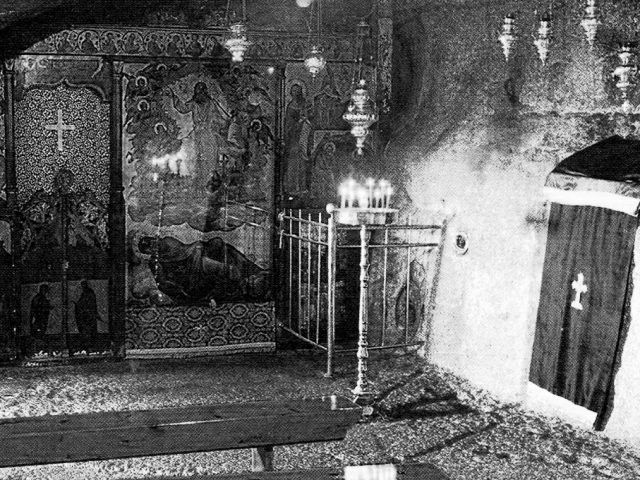“Amen; yes, come, Lord Jesus”
(Rev. 22:20)
Here is the longing of the true Christian heart. From it is ever welling up a desire for Christ the Lord; a seeking of Him ever more and more. This is both personal and corporate. It is both an ongoing and reoccurring event and simultaneously one of most singular and unrepeatable uniqueness.
The daily cry of the true Christian heart is “come Lord Jesus,” come today, this hour and minute and purify me of all impurity, wash me of my sin. Come Lord Jesus. This is the pulse of the Christian heart. This cry will find its final culmination at the end of time in the Second coming of our Lord Jesus. He returns in answer to the cry of His beloved children – Come!
This eschatological cry is also the heart of the Worship of the Church. It is the most mysterious treasure of the Divine Liturgy. “Remembering this saving commandment and all those which have come to pass for us: the Cross, the Tomb, the Resurrection on the third day, the Ascension into heaven, the Sitting at the right hand, and the second and glorious Coming.” Come Lord Jesus. Remembering – establishing steadfast and deep in the heart as a living reality. The whole Testament of the Divine Liturgy is the longing to receive Christ Jesus, to receive Him in His Body and Blood through Holy Communion and to receive the final manifestation of this mystery – the absolute return of the God-Man Jesus Christ.
“And this is His commandment: that we should believe on the name of His Son Jesus Christ, and love one another, as He gave us commandment,” proclaims the Theologian John (1 Jn. 3:23). The great Father of our times, Justin Popovich, comments, “Behold, the condensed Gospel of salvation: faith in Christ and divine love. Actually, the two are one commandment, because they combine one feeling with one disposition: he who believes in Christ believes because he loves Him. Love grows through faith, and through love, faith grows. One through the other increase and perfects itself … Faith reveals to man the mystery of the God-man; the more man knows the Lord Christ, the more he loves Him. The more he loves Him, the more the mystery of Christ is revealed.”
And for the fervent Christian heart these words of divine direction are given, “And he who keeps His commandments dwells in Him, and He in him. And thereby we know that He abides in us, by the Spirit which He has given” (1 Jn. 3:24). The commandments are the very life of God. They are the rays of our Lord’s Divine grace and energy whereby we enter into living communion with Him. By living in the commandments we cry, “Come, Lord Jesus.”
St. Justin exclaims, “For He is present in every commandment through His grace-filled power, and He helps every struggler to keep the commandments. At the same times, the evangelic principle of theanthropic cooperation is kept; the God-man collaborates with man, while man remains an independent person, even though his entire being is in the Lord Christ, even though he ‘dwells in Him.’ In the same way, the Lord Christ ‘dwells in man,’ and does not lose the fullness of His Person … Keeping the commandments trinitizes man, because this Christianizes and spiritualizes him.”
The holy Apostle Paul teaches, “For as many as are led by the Spirit of God, these are the sons of God. For you did not receive a spirit of bondage again to fear, but you received a Spirit of adoption, whereby we cry, ‘Abba, Father’” (Rom. 8:14-15)
The Spirit is in the commandments and the commandments are of the Spirit. It is through being faithful to Christ in His living commandments whereby we then participate in that same One Spirit of God, the Holy Spirit. Our Lord Himself told us, “If you love Me, keep my commandments. And I will pray the Father, and He will give you another Helper, that He may abide with you forever – the Spirit of Truth, Whom the world cannot receive, because it neither sees Him nor knows Him; but you know Him, for He dwells in you and will be in you” (Jn 14:15-17). It is this same Spirit Whom the Lord Jesus promises will “guide you in all truth” (cf. Jn. 16:13). “He will,” the Lord says, “glorify Me, for He will take of what is Mine and declare it unto you” (ibid 16:14).
The third Person of the Holy Trinity, the Spirit of Truth, will manifest in the Body of Christ and in the heart of a true believer. From this eternal and never changing well-spring is Truth then proclaimed. From this inexhaustible font the Saints have lived and spoken.
The imperative to be acquiring the grace of the Holy Spirit is essential to true Christian living. Ever renewed in the eternal grace of the Spirit, the Christian cry’s out, “Come, Lord Jesus.”
For many spirits try to come to mankind. “Beloved, believe not every spirit, but try the spirits whether they are of God: because many false prophets are gone out into the world” (1 Jn. 4:1). St. Justin teaches, “The discernment of spirits is, simultaneously, a gift of the Holy Spirit and a struggle on man’s part. It is a complete science in itself … The struggle is simultaneously a work of the grace of God and the free work of man. Long is man trained and instructed in the discernment of spirits; gradually he is perfected; and only the perfect have the gift of discernment of spirits, of completely clear orientation, of completely clear knowledge and observation of the essence of good and evil.”
This is why we are given the sure living testimony of Christ in His Saints. They have been perfected and tested and therefore are true guides on the path of Truth. False prophets are those that will try to undermine and alter the testimony of Christ in His saints. They speak not from the Spirit of God but from other spirits. The problem is that they still at times claim to be speaking for Christ. Those who would seek to sow doubt in the testimony of Christ in His saints are those who, consciously or unconsciously, are seeking to destroy the commandments of Christ. Those who would actively deconstruct the living Traditions of Christ in His Church are but liars.
“Hereby you know the Spirit of God: Every spirit that confesses that Jesus Christ is come in the flesh is of God: and every spirit that does not confess that Jesus Christ is come in the flesh is not of God; and this is the spirit of antichrist, whereof you have heard that it should come; and even now already is in the world” (1 Jn. 4:2-3).
The goal of the enemy is to destroy Truth. An impossible task, yet he tries all the same. We deny Christ coming in the flesh – His manifestation and revelation to mankind – and His commandments when we attempt, in their stead, to install “improved” commandments. The spirit of antichrist desires to replace Christ at any cost, warns St. Justin; most of all in the hearts of those who are called Christians.
The enemy seditiously seeks to undermine and eradicate the true commandments of Christ and in there place establish anti-commandments. He knows that the true commandments are life, and by convincing a Christian to willingly reject them in favor of other commandments he knows that death will ensue. In the place of the unity of the One Holy Church he establishes Ecumenism. In the place of Gospel Love in Truth (for Truth and Love are inseparable) he builds “tolerance and inclusiveness.” In the place of repentance he teaches “acceptance.” In the place of the Kingdom of Heaven he builds the kingdom of the world. In place of the virtues of male and female being recreated into the image and likeness of God, he institutes an anti-image; one that is set upon destroying all boundaries of the true commandments through the deconstruction of humanity as exemplified in Feminist and LGBTQ ideology.
St. Justin preaches, “The creator of every anti-Christian ideology is the Antichrist, directly or indirectly. In reality, every ideology can be put into categories: those on the side of Christ and those on the side of Antichrist. Man, in actuality, is in the world to solve one problem: is he with Christ or against Him? Every man, whether he wants to or not, solves this problem. He is either a lover of Christ of a fighter against Christ – a third does not exist. A worshipper of Christ or a hater of Christ.”
If the commandments of Christ begin to wither in the Christian heart and are then replaced with anti-commandments, then the cry, so terrible to the Devil, of, “Come, Lord Jesus” begins to wane. Existing in the “improved” anti-commandments a novel cry springs forth from the formerly Christian heart, one not for the Spirit of God but for the spirit of this fallen world – “Stay, Jesus, we are fine as we are.”
The enemy fears few things more than the deep and fervent cry of a Christian heart, established firmly on the commandments of Christ, – “Come, Lord Jesus.”
(This article continues upon themes I touched upon in a former article, The Inverted Commandments.)


